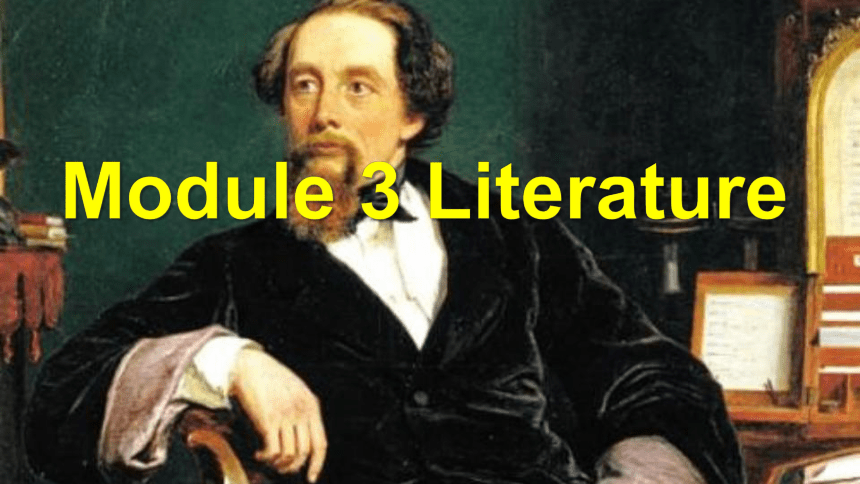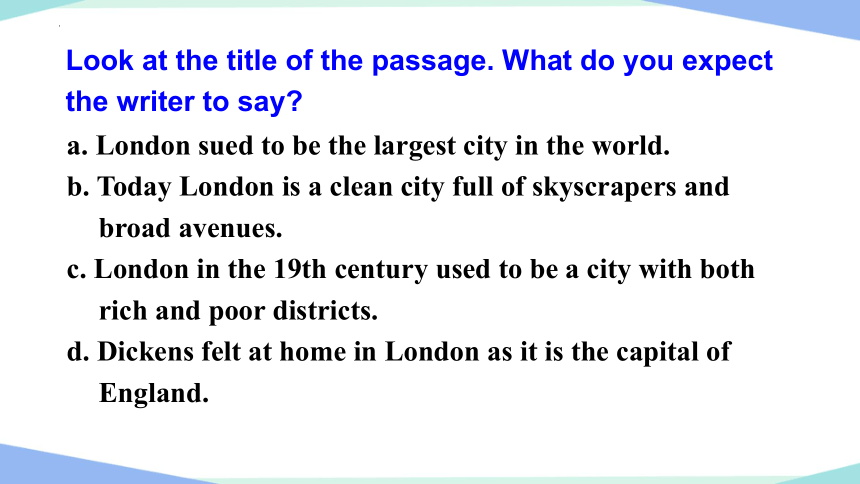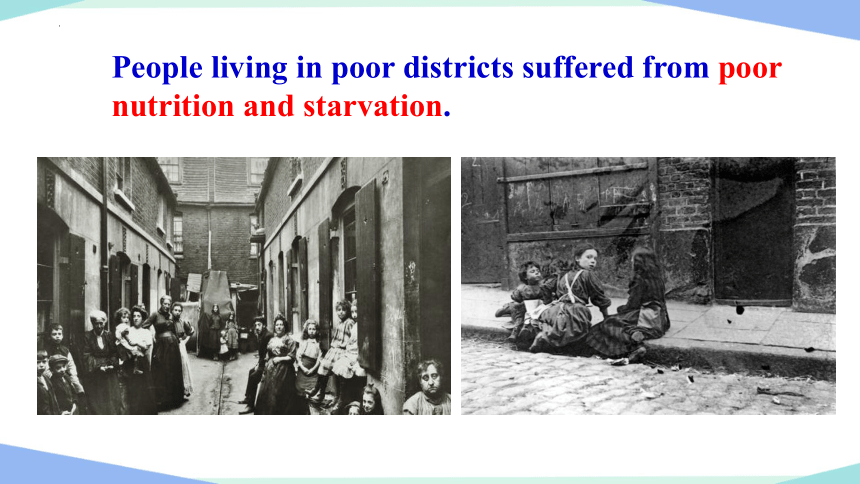外研版选修七Module3 Literature-Reading Practice课件(24张PPT)
文档属性
| 名称 | 外研版选修七Module3 Literature-Reading Practice课件(24张PPT) |

|
|
| 格式 | zip | ||
| 文件大小 | 2.0MB | ||
| 资源类型 | 教案 | ||
| 版本资源 | 外研版 | ||
| 科目 | 英语 | ||
| 更新时间 | 2022-03-09 11:31:20 | ||
图片预览









文档简介
(共24张PPT)
Module 3 Literature
Reading Practice
Dicken’s London
Learn about London in the 19th century.
Look at the title of the passage. What do you expect the writer to say
a. London sued to be the largest city in the world.
b. Today London is a clean city full of skyscrapers and broad avenues.
c. London in the 19th century used to be a city with both rich and poor districts.
d. Dickens felt at home in London as it is the capital of England.
Where do the characters in Dickens' novels live
What was London like in Victorian Age
the London port
fountain
A filthy city filled with strong smog created by chimney pipes.
People living in poor districts suffered from poor nutrition and starvation.
a. Dickens’ cast of characters lived in London, the largest and richest city in the world.
b. Every chapter of his novels describes the sights, sounds, and smells of the city, and provides a social commentary of London life.
c. In the middle of the 19th century, London was a filthy city for rich and poor people alike.
d. London is very different today, and few people mourn the passing of the old city.
Read the passage and choose the sentence which best
expresses its main idea.
a. a narrative
b. a description
c. an argument
Decide what text type the passage is.
In which order is the passage developed
chronological order
spatial order
c) causal order
From what aspects does the author describe London
1. The environment
filthy
smog choke
polluted
dangerous to swallow…
1) The poorest district:
2) The business and financial district:
3) The theatre district:
2. The different districts
The East End and Southwark
The old City of London, Somerset House, the Law Courts, squares and gardens
The West End (the London of government)
1. Few people had a good standard of living because _____.
a. the taxpayers didn’t care about them
b. the city was polluted
c. there were huge numbers of poor people
d. the wealth was distributed unfairly among the
population
Read the passage carefully and choose the correct answers.
2. Poverty was so severe that ____.
a. some people were ill because they didn’t have enough to eat
b. children wore rags for school
c. the river became polluted and caused disease and death
d. it was dangerous to swallow the water if you fell in the river
3. The port of London was where___.
a. the districts of the East End and Southward were
b. the poorest people lived
c. men queued for work every day
d. ships came from all over the world to load and unload their goods
4. The old City of London was _____.
a. the business and financial district of London
b. where Dickens lived
c. where the Law Courts and many restaurants and squares were
d. Dickens set his stories
5. The further west you went in Dickens’ London ______.
a. the more Dickens felt at home
b. the richer and more important the people who lived
there were
c. the safer it was to walk at night
d. the less it looks like London today
Complete the sentences in your own words.
Dickens provides a social commentary of London life in the nineteenth century because _______________
_____________________________________________.
2. London was polluted because ___________________
_____________________________________________.
the life of all of the people who lived there
he writes about
on factory smoke or pouring waste into the Thames
there was no control
3. In the East End people wore rags and searched for food in dustbins because _____________________________
______________________________________________.
4. Dickens wanted to be known as a writer of plays because ______________________________________________
______________________________________________.
5. Few people miss London in the 19th century because _____________________________________________.
they didn’t have money to buy
their own food
he thought he would get his message across to people better
much of it was very unpleasant to live in
…yet their welfare was of no concern to the taxpayers of
London.
concern
n. a feeling of worry 担心; 忧虑
a desire to protect and help sb./sth. 关爱; 关心
sth. that is important to you or that involves you 关心的事
v. to affect/involve sb./sth. 影响; 涉及; 牵涉
to be about sth. 与……有关
to worry sb. 让(某人)担忧
e.g.
Some scientists wrote letters to the newspaper editors, showing their greatest concern for / about / over the problem.
There is widespread concern that new houses will be built on protected land.
The Prime Minister expressed his concern over the homeless people.
Earning a living was his first concern.
What concerns me is our lack of preparation for the change.
Anything that concerns Gordon interests me.
【运用】写出下面句子中concern的词性及中文释义。
1) Helen hasn’t been seen for four days and there is concern for her safety. ________ ________
2) The children’s education was a continuous concern to him. ________ __________
3) What I have to say to Susan doesn’t concern you.
_______ __________________
v. 关系到, 与……有关
n. 担心
n. 关心的事
Write a description of your town or nearest big city. Describe what it was like in the past.
Module 3 Literature
Reading Practice
Dicken’s London
Learn about London in the 19th century.
Look at the title of the passage. What do you expect the writer to say
a. London sued to be the largest city in the world.
b. Today London is a clean city full of skyscrapers and broad avenues.
c. London in the 19th century used to be a city with both rich and poor districts.
d. Dickens felt at home in London as it is the capital of England.
Where do the characters in Dickens' novels live
What was London like in Victorian Age
the London port
fountain
A filthy city filled with strong smog created by chimney pipes.
People living in poor districts suffered from poor nutrition and starvation.
a. Dickens’ cast of characters lived in London, the largest and richest city in the world.
b. Every chapter of his novels describes the sights, sounds, and smells of the city, and provides a social commentary of London life.
c. In the middle of the 19th century, London was a filthy city for rich and poor people alike.
d. London is very different today, and few people mourn the passing of the old city.
Read the passage and choose the sentence which best
expresses its main idea.
a. a narrative
b. a description
c. an argument
Decide what text type the passage is.
In which order is the passage developed
chronological order
spatial order
c) causal order
From what aspects does the author describe London
1. The environment
filthy
smog choke
polluted
dangerous to swallow…
1) The poorest district:
2) The business and financial district:
3) The theatre district:
2. The different districts
The East End and Southwark
The old City of London, Somerset House, the Law Courts, squares and gardens
The West End (the London of government)
1. Few people had a good standard of living because _____.
a. the taxpayers didn’t care about them
b. the city was polluted
c. there were huge numbers of poor people
d. the wealth was distributed unfairly among the
population
Read the passage carefully and choose the correct answers.
2. Poverty was so severe that ____.
a. some people were ill because they didn’t have enough to eat
b. children wore rags for school
c. the river became polluted and caused disease and death
d. it was dangerous to swallow the water if you fell in the river
3. The port of London was where___.
a. the districts of the East End and Southward were
b. the poorest people lived
c. men queued for work every day
d. ships came from all over the world to load and unload their goods
4. The old City of London was _____.
a. the business and financial district of London
b. where Dickens lived
c. where the Law Courts and many restaurants and squares were
d. Dickens set his stories
5. The further west you went in Dickens’ London ______.
a. the more Dickens felt at home
b. the richer and more important the people who lived
there were
c. the safer it was to walk at night
d. the less it looks like London today
Complete the sentences in your own words.
Dickens provides a social commentary of London life in the nineteenth century because _______________
_____________________________________________.
2. London was polluted because ___________________
_____________________________________________.
the life of all of the people who lived there
he writes about
on factory smoke or pouring waste into the Thames
there was no control
3. In the East End people wore rags and searched for food in dustbins because _____________________________
______________________________________________.
4. Dickens wanted to be known as a writer of plays because ______________________________________________
______________________________________________.
5. Few people miss London in the 19th century because _____________________________________________.
they didn’t have money to buy
their own food
he thought he would get his message across to people better
much of it was very unpleasant to live in
…yet their welfare was of no concern to the taxpayers of
London.
concern
n. a feeling of worry 担心; 忧虑
a desire to protect and help sb./sth. 关爱; 关心
sth. that is important to you or that involves you 关心的事
v. to affect/involve sb./sth. 影响; 涉及; 牵涉
to be about sth. 与……有关
to worry sb. 让(某人)担忧
e.g.
Some scientists wrote letters to the newspaper editors, showing their greatest concern for / about / over the problem.
There is widespread concern that new houses will be built on protected land.
The Prime Minister expressed his concern over the homeless people.
Earning a living was his first concern.
What concerns me is our lack of preparation for the change.
Anything that concerns Gordon interests me.
【运用】写出下面句子中concern的词性及中文释义。
1) Helen hasn’t been seen for four days and there is concern for her safety. ________ ________
2) The children’s education was a continuous concern to him. ________ __________
3) What I have to say to Susan doesn’t concern you.
_______ __________________
v. 关系到, 与……有关
n. 担心
n. 关心的事
Write a description of your town or nearest big city. Describe what it was like in the past.
